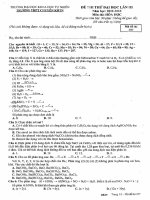Tải Đề thi thử THPT quốc gia 2019 môn Tiếng Anh THPT chuyên Khoa học Tự nhiên lần 3 kèm đáp án - Đề thi THPT Quốc Gia môn Tiếng Anh có đáp án
Bạn đang xem bản rút gọn của tài liệu. Xem và tải ngay bản đầy đủ của tài liệu tại đây (937.95 KB, 10 trang )
<span class='text_page_counter'>(1)</span><div class='page_container' data-page=1>
<b>ĐỀ THI THỬ THPT QUỐC GIA MÔN TIẾNG ANH</b>
<b>NĂM 2019 CÓ ĐÁP ÁN</b>
<b>Read the passage and mark the letter A, B, C or D on your answer sheet to indicate the </b>
<b>correct answer to each of the question from 1 to 5.</b>
Are organically grown foods the best food choices? The advantages claimed for such foods
over conventionally grown and marketed food products are now being debated. Advocates
of <i><b>organic foods –</b></i> a term whose meaning varies greatly – frequently proclaim that
such products are safer and more nutritious than others.
The growing interest of consumers in the safety and nutritional quality of the topical North
American diet is <i><b>a welcome development</b></i>. However, much of this interest has been
sparked by sweeping claims are not supported by scientific evidence, the preponderance of
written material advancing such claims make it difficult for the general public to separate
fact from fiction. As a result, claims that eating a diet consisting entirely or organically
grown foods prevents or cures disease or provides other benefits to health have become
widely publicized and formed the basis for folklore.
Almost daily the public is besieged by claims for “no – aging” diets, new vitamins, and other
wonder foods. There are numerous unsubstantiated reports that natural vitamins are superior
to unsubstantiated eggs, that untreated grains are better than fumigated grains, and the like.
One thing that most organically grown foods products seem to have in common is that they
cost more than conventionally grown foods. But in many cases consumers are misled if they
believe. So there is real cause for concern if consumers, particularly those with limited
incomes, distrust the regular food supply and busy expensive organic foods instead.
Question 1: The <i><b>“welcome development”</b></i> mentioned in paragraph 2 is an increase
in
</div>
<span class='text_page_counter'>(2)</span><div class='page_container' data-page=2>
B. The nutritional quality of the topical North American diet
C. The amount of healthy foods grown in North American
D. The number of consumers in North American
Question 2: According to the first paragraph , which of the following is true about the
term <i><b>“organic foods”</b></i>?
A. It is accepted by most nutritionist
B. It has been use only in recent years
C. It has no fixed meaning
D. It is seldom used by consumers
Question 3: The author implies that these is cause for concern if consumers with limited
incomes by organic foods instead of conventionally grown food because __________
A. Organic foods can be more expensive but are often no better than conventionally grown
foods
B. Many organic foods are actually less nutritious than similar conventionally grown foods
C. Conventionally grown foods are more reality available than organic foods
D. Too many farmers will stop using conventional methods to grow food crops
Question 4: According to the last paragraph, consumers who believe that organic foods are
better than conventionally grown foods are often ___________
A. Careless B. mistaken C. thrifty D. wealthy
Question 5: What is the author’s attitude towards the claims made by advocates of health
foods?
A. Very enthusiastic B. skeptical C. neutral D. somewhat
favorable
</div>
<span class='text_page_counter'>(3)</span><div class='page_container' data-page=3>
A. Innovative B. benevolent C. guilty D. naive
Question 7: Affluent families find it easier to support their children financially
A. Wealthy B. impoverished C. privileged D. well-off
<b>Mark the letter A, B, C or D on your answer sheet to indicate the word(s) CLOSET in </b>
<b>meaning to the underlined word(s) in each of the following questions from 8 to 9.</b>
Question 8: The repeated commercials on TV distract many viewers from watching their
favorite films.
A. Contests B. economics C. advertisements D. businesses
Question 9: As tourism is more developed, people worry about the damage to the flora and
fauna of the island.
A. Plant and animals B. fruits and vegetables
C.Flowers and trees D. mountains and forests
<b>Mark the letter A, B, C or D on your answer sheet to indicate the word that differs </b>
<b>from the other three in the position of primary stress in each of the following questions </b>
<b>from 10 to 11.</b>
</div>
<span class='text_page_counter'>(4)</span><div class='page_container' data-page=4></div>
<span class='text_page_counter'>(5)</span><div class='page_container' data-page=5></div>
<span class='text_page_counter'>(6)</span><div class='page_container' data-page=6></div>
<span class='text_page_counter'>(7)</span><div class='page_container' data-page=7></div>
<span class='text_page_counter'>(8)</span><div class='page_container' data-page=8></div>
<span class='text_page_counter'>(9)</span><div class='page_container' data-page=9></div>
<span class='text_page_counter'>(10)</span><div class='page_container' data-page=10></div>
<!--links-->









